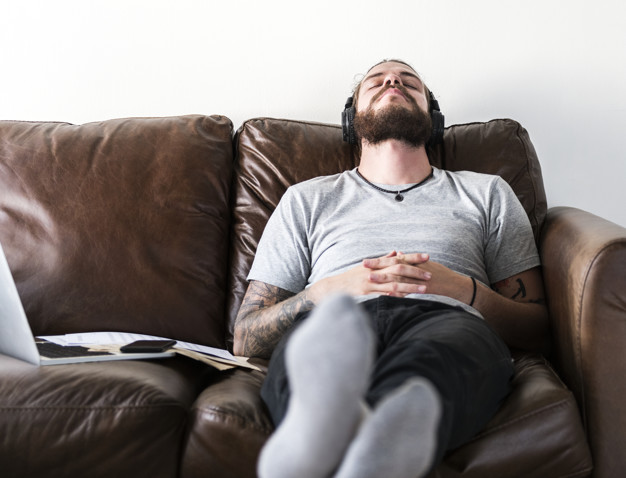With the coronavirus (COVID-19) pandemic spreading in the world, the very word “crisis” can make people nervous. However, do not allow your instincts to get you into a panic. This may lower your ability to work intensively and damage your health considerably. Here are some ways that can help you find your calm, get through the virus scare, and keep you cool in stressful situations.
11 tips for staying calm during a crisis
1. Slow down

First of all, try not to react immediately. It is better to collect more information and stay patient instead. Try to ask yourself relevant questions like “Is it going to cause some problems several years from now?” If your answer is “no,” it is worth removing yourself from the present situation. Besides, if you are working from home, a good idea is to view yourself as a representative of your company, not a participant. This way, you will improve your ability to make decisions and remain less emotional.
2. Breathe
Although you may think there are no effective ways around such stressful times, a simple breathing exercise can help you respond to the situation adequately. Breathing makes your blood flowing and thus helps great ideas come to your mind. With a calm heart and clear head, it is easier to spend this time on what is best for you. Breathe in until you count to five, hold your breath for several seconds, and then slowly breathe out. Repeat this exercise at least 10 times, and you will feel how your pressure is eased. In order not to lose count, use your fingers. This is easy to do at any time and extremely useful. So, if you feel overwhelmed, do not hesitate to try this method. You will probably enjoy the benefits.
3. Never ask “What if”

One of the questions you should never ask yourself or other people in times of economic crisis and social isolation is “what if.” This line of questioning makes you process situations that may never happen, which can lead to growing panic. Such questions exacerbate the problems and aggravate the fear.
4. Get enough sleep

One of the most common mistakes is staying up late to get the work done and meet all the deadlines. Good rest is of the utmost importance. Our bodies require enough sleep, or otherwise, they produce hormones that make us even more nervous and stressed. Set a bedtime and try to go to sleep at the same time every day. Remember that even if you have not finished all your tasks yet, they can wait until the morning. Do not take on too much at once!
5. Take breaks

Even though you are not in the office or classroom, there is still the possibility of overworking. Therefore, do not forget to take breaks during your working day. Go to the bathroom or take snack or lunch breaks whenever you want. Keep in mind that humans tend to forget about their needs in the working mode. Think of working from home as a time of freedom. Follow the directions of your body and take a deserved break if you want it.
6. Take care of your body

You are supposed to be fit enough to handle a crisis, so make your health number one priority. Make sure you exercise regularly, eat a balanced diet, and receive plenty of sleep. Taking enough exercise can help your body function properly and lower the level of stress hormones. With improved health, you will increase your emotional intelligence, self-control, and memory, which will help you deal with any emergencies.
7. Give yourself grace
There are a lot of things that can be new for you during this difficult time. Moving a whole life online is not easy, while offering and getting services through a computer screen all the time can make anyone struggle. If you have already faced some challenges along the way, laugh about them and give yourself grace. Nobody is perfect! You will certainly handle all the roadblocks; just give yourself enough time.
8. Create art

It is no secret that the global pandemic and social isolation seriously affect mental health. According to russianicon.com, art – especially religious art – enables people to adjust better to stressors in their everyday lives and helps decrease stress. It is an effective way to manage past emotions related to stressful events. Try to find more information about simple art projects to do, the benefits of creating art, and professional art therapy as well.
9. Limit caffeine
There are many temptations in our lives, and one of them is probably a cup of coffee. Caffeine gives you a quick burst of physical strength and energy thanks to adrenaline. However, your favorite latte can make you feel anxious and irritated in some cases. It is better to hydrate yourself with water instead of supping that cup of coffee, energy drink, or soda.
10. Enjoy the small things

Spend as much time being at home with your family as possible. Watch a nice film lying in a hot bubble bath in the middle of the day, call your friend, or play with your pets. As humans, we never have enough time for doing what we love. Take advantage of this period of time and try to enjoy the small things you usually look over.
11. Ask for help
Never be afraid to ask for a piece of advice, especially in a stressful situation. In a time of crisis, you more than ever need someone who is not emotionally invested. Your close friends or relatives will help you arrive at potential solutions, as they can see the dilemma from a different perspective. Reach out to people you trust, and you will feel yourself more confident and grounded. Your anxiety and stress will be controlled by that security.
Staying calm during uncontrollable situations is extremely important. Try to find the positives as much as possible. Remember that you are not alone. We are all together trying to undergo this difficult experience. So take a deep breath and relax!
 Imagup General Magazine 2024
Imagup General Magazine 2024



